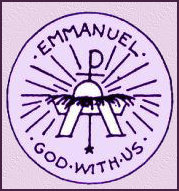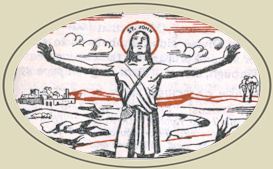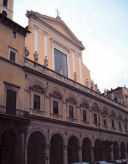» Enjoy our Liturgical Seasons series of e-books!
Today the Church celebrates the Fourth Sunday of Advent. We light the last candle on our Advent wreath and our preparation for Christmas is almost finished. We also reach the culmination of the O Antiphons. In previous antiphons our cry was directed to the Messiah as He manifested Himself to the Chosen People, to the Gentiles, and in nature; now He is addressed in person and asked to remain with us as Emmanuel.
Reading this final antiphon gives the feeling that a climax has indeed come. The very term Emmanuel, God with us, reveals the kindly, human heart of Jesus — He wants to be one of us, a Child of man, with all our human weakness and suffering; He wants to experience how hard it is to be man. He wants to remain with us to the end of time, He wants to dwell within us, He wants to make us share His nature.
The feast of St. John of Kanty, which is ordinarily celebrated today, is superseded by the Sunday liturgy.
Click here for commentary on the readings in the 1962 Missal of the Roman Rite.
![]()
Sunday Readings
The first reading is taken from the Prophecy of Micah 5:1-4. In today's reading we hear words of hope that focus on one who is to be born in Bethlehem and who will bring in the day of peace when all nations will look to Jerusalem.
The second reading is taken from Hebrews 10:5-10. The perfect offering of Christ restores us to oneness with God. Jesus came to do the will of God perfectly. He overcame the power of evil that separates us from God and became our bridge back to God when we fall into evil. David prefigures Christ's sacrifice. The Psalm is now seen from the perspective of Christ.
The Gospel of this Sunday, Luke 1:38-45 recounts the visit of Mary to St. Elizabeth. An ancient title of Mary is Ark of the Covenant. The Church Fathers saw the parallels between the Old Testament wooden chest containing the divine presence and the Virgin about to give birth to Jesus. This theme is developed in a tape series by Tim Staples. Tim brings out the similarities between today's Gospel and the ascent of the Ark to Jerusalem (2 Sam 6:1-15).
1. As the ark is brought to Jerusalem, King David is overcome with awe saying, "How can the ark of the Lord come to me?" (v. 9)
2. The ark remains three months in the hill country near Jerusalem, bringing great blessings to the house of Obed-edom. (v.11)
3. King David leaps for joy -- dancing before the ark. (v. 13) (Tim Staples, All Generations Shall Call Me Blessed)
In today's Gospel, Elizabeth says to Mary, "Who am I that the Mother of my Lord should come to me?" She tells how the babe (John the Baptist) leaped in her womb as she became filled with the Holy Spirit. Finally Mary remains three months with her kinswoman before returning to her home. This Sunday, so close to Christmas, the Church invites us to focus our attention on Mary, round-wombed because of the God-child. As we say in the Litany of the Blessed Virgin: "Ark of the Covenant, pray for us."
Excerpted from Fr. Phil Bloom
![]()
O Emmanuel
"O Emmanuel (God with us), our King and Lawgiver, Thou expected one of the nations and their Redeemer, come and save us, O Lord our God."
Now we are about to receive the Savior, Emmanuel, God with us. God's only-begotten Son, born of the Father before all time, God of God, light of light, true God of true God, one being with the Father, is about to be born in time. For the salvation of men, He has come down upon earth and is conceived by the Holy Ghost in a virgin. He shall be called God with us, and yet He will be one in nature with us. He is to be like to us in all things except sin. He wills to share our poverty and to pray and suffer with us; He assumes our guilt. He is God with us in every phase of our life; He even takes our place on the cross, He remains with us in Holy Communion, in our daily Mass, and in our tabernacles. At some time in the future He will still be God with us in His beautiful heaven. All this He has done for us even though we have repeatedly turned our back on Him.
Come and save us." The great God is with us. He has come, not to destroy the sinful world, as He once destroyed Sodom and Gomorrha, but to redeem it from its sins. This redemption is to be accomplished at the cost of great personal sacrifice to Him. As if this did not satisfy the burning ardor of His love, He wills to remain with us in our tabernacles. He incorporates us into Himself and shares His very life with us. We are engrafted in Him as a branch might be grafted to a new tree. "I am the vine, you are the branches" (John 15:5). God with us! We are united to Christ as a limb is united to a body, as a branch is united to a vine. We now belong to Christ and no longer to ourselves. We are one with Him. What a grace, what greatness, what nobility have been conferred upon us! God looking upon us no longer sees miserable specimens of mankind, but members of Christ. When He looks upon Christ, He sees Christ and us as united in one body, as a tree united to its branches. Even the smallest leaf fluttering on the farthest branch belongs to that tree and lives by the sap of that tree. Could He have redeemed us in a more perfect manner than by thus implanting in us and infusing in us His divine life? Let us reflect upon this seriously.
God with us! It was that He might be with us that He came that first Christmas at Bethlehem. He came that He might lift me up from the dust, and that I might share in His life. He will return this Christmas that He may continue and complete that work. It is for the same purpose that He comes in every Holy Mass and Communion, and in each inspiration and grace He gives us. His final coming will be for the same purpose, and will have the further aim of sharing with us His glorified life in heaven. We shall then enjoy the perfect vision of God, perfect love, and the fulfillment of all our desires for all eternity. For all eternity!
Excerpted from The Light of the World by Benedict Baur, O.S.B.
![]()
 7th O Antiphon:
7th O Antiphon:
Symbols: Manger
Come to save us, O Lord our God.
O Emmanuel, God with us, our King and Lawgiver, the expected of the nations and their Savior: Come to save us, O Lord our God.
O Emmanuel, Rex et legifer noster, expectatio gentium, et Salvator earum: veni ad salvandum nos, Domine, Deus noster.
The manger reminds us of the simplicity and poverty surrounding the birth of Jesus and is representative of His life of humility.
Recommended Readings: Isaias 9:2-7
![]() Today is Day Eight of the Christmas Novena.
Today is Day Eight of the Christmas Novena.
 Commentary for the Readings in the 1962 Roman Missal:
Commentary for the Readings in the 1962 Roman Missal:
Fourth Sunday of Advent
"John, the son of Zachary," to a world now awaiting its God, pleads for our final pre-Christmas "make ready." "Make ready the way of the Lord, make straight His paths" (Gospel).
Heroically, in the desert, he warns against the softness of life in the city, pictured in the background. Alive to the danger of a "soft garments" life, he is seen in a rough "garment of camel hair," carrying a baptismal shell, "preaching a baptism of repentance."
Excerpted from My Sunday Missal, Confraternity of the Precious Blood
Advent Reflection: The Light of a New Humanity
Anyone who goes through our streets in the early days of December will often meet him, Santa Claus, dressed more or less as a bishop and never without his long white beard (which has been attributed to him since at least the eighth century). What these Santa Claus figures say and do is also more or less episcopal in nature; often they are more in the role of the bogeyman than of one who makes present the love of the Holy One, that love of which the legend speaks in many variations. It is almost impossible to tell with historical precision who this man was; and yet, by listening attentively to the oldest sources, through the mists of time, we can still discern the radiance of a figure who opens up a door to Advent, who can mediate, that is, an to of Jesus Christ.
In his portrayal of the life of St. Nicholas, his most ancient biographer, a certain Archimandrite Michael, says that Nicholas received is dignity from Christ's own sublime nature just as the morning star receives its brilliance from the rising sun. Nicholas was a living imitation of Christ: "In the radiance of his virtues", says the biographer, "the sun's righteousness has dawned." Tradition has always equated Santa Claus with the Bishop Nicholas who participated in the Council of Nicaea and, together with that first great assembly of bishops, helped to formulate the affirmation of the true divinity of Jesus Christ. What was at stake here was the core of Christianity, whether Christianity was to become just another sect or something really new, faith in the Incarnation of God himself. Was Jesus of Nazareth only a great religious man, or had God himself actually become, in him, one of us? So, ultimately, the question was this: Is God so mighty that he can make himself small; is he so mighty that he can love us and really enter our lives? For if God is too far away from us to love us effectively, then human love too is only an empty promise. If God cannot love, how can man be expected to do so? In professing faith in God's Incarnation, therefore, it was ultimately a case of affirming also man's capacity to live and die in a human manner. The figure of St. Nicholas, Santa Claus, illustrates and symbolizes this connection.
Theodor Schnitzler put this very well: "In putting his signature, in faith, to the mysterium of the incarnate Son of God, a person is enabled to be a helper of his fellow men, to bring happiness to children, families and the oppressed. Faith in the Incarnation promotes the salvation of mankind and the implementation of human rights."
The oldest sources concerning St. Nicholas also point in the same direction from a different angle: Nicholas is one of the first people of to be venerated as a saint without having been a martyr. During the persecution of Christians, those who opposed the pagan state power and gave their lives for their faith had quite automatically become great examples of faith. When peace was concluded between Church and state, people needed new models. Nicholas impressed them as one ready to help others. His miracle was not that of great heroism in the face of torture, imprisonment and death. It was the miracle of constant kindness in everyday life.
Another of the legends expresses it very beautifully in this way: Whereas all the other miracles could be performed by magicians and demons, and thus were ambivalent, one miracle was absolutely transparent and could not involve any deception, namely, that of living out the faith in everyday life for an entire lifetime and maintaining charity. People in the fourth century experienced this miracle in the life of Nicholas, and all the miracle stories which accrued subsequently to the legend are only variations on this one, fundamental miracle, which Nicholas' contemporaries compared, with wonder and gratitude, to the morning star reflecting the radiance of the light of Christ. In this man they understood what faith in God's Incarnation means; in him the dogma of Nicaea had been translated into tangible terms.
The morning star which receives its light from the rising sun—this ancient description of St. Nicholas is also one of the oldest images of the meaning of Advent. If we are to be continually lighting candles of humanity, giving hope and joy to a dark world, we can only do so by lighting them from the light of God incarnate. This, at the deepest level, is the message of all Santa Claus figures: from the light of Christ we are to light the flame of a new humanity, caring for the persecuted, the poor, the little ones—this is the core of the legend of St. Nicholas.
—Joseph Cardinal Ratzinger, Seek That Which is Above

Fourth Sunday of Advent
Station with Ss. XII Apostoli or Santi Dodici Apostoli (Church of the Twelve Holy Apostles):
At Rome, the Station is in the Basilica of the Twelve Apostles, better known in Rome as better known as Santi Apostoli. We receive today a twelve-fold blessing from the apostles with whom we celebrate this last Sunday of Advent. As living stones we are built on these twelve solid and sacred foundation stones who themselves rest on the divine cornerstone, Christ. Ye holy apostles of Christ, be with us and pray for us, that with well-prepared hearts we may "go forth to meet Him, and say: Great is His dominion, and His kingdom will have no end; He is God, the Mighty, the Ruler, the Prince of Peace."
For more on Santi Dodici Apostoli, see:
For further information on the Station Churches, see The Stational Church.



